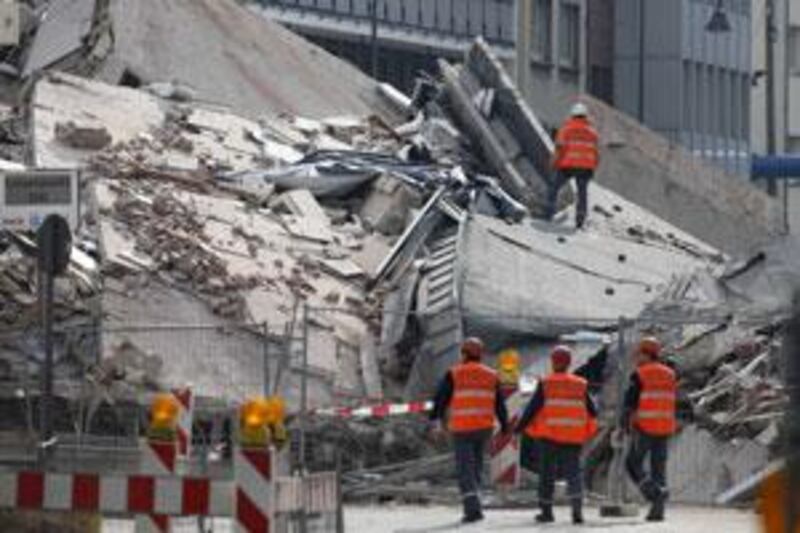BERLIN // The loss of historical records stretching back a millennium would weigh heavily anywhere but is especially troubling to the Germans, who had much of their national heritage wiped out in the flames of the Second World War. So Tuesday's collapse of the building that contained the city archive of Cologne, one of Europe's biggest municipal archives with documents dating back as far as 922, is being seen as nothing short of a cultural disaster.
Medieval records on property ownership and court trials, writings by Karl Marx and items bequeathed by composer Jacques Offenbach, Nobel Prize winning author Heinrich Böll and West Germany's first post-war chancellor, Konrad Adenauer, are among 65,000 documents now buried under tonnes of rubble. Most employees managed to get out after cracks suddenly appeared in the walls and ceilings of the 38-year-old, four-storey building on Tuesday afternoon.
It caved in minutes later in a landslide believed to have been caused by the construction of an underground train tunnel nearby. Two men were still unaccounted for as of last night. Historians said Cologne, Germany's richest and most important city during the Middle Ages, had lost its memory. "This is worse than a disaster," said Prof Hugo Stehkämper, director of the archive from 1969 until 1994, adding that he had suffered a sleepless night because of it.
"I can't believe that the archive managed to survive the war and now this happens in peacetime. This isn't just a huge blow to Cologne, it's a loss for Europe as well." Germany's fourth-largest city is as old as the nation itself, and has been at the centre of Germany's violent history through the ages. It was a grand Roman city and became a wealthy trading centre in the Middle Ages, with commercial links stretching as far as Russia and Spain. It was occupied by Napoleon, and then became part of the Prussian kingdom.
Most of the city centre was destroyed in 262 Allied air raids during the Second World War, but the twin-spired cathedral, Germany's most famous landmark, miraculously survived. Researchers from around the world have visited the Cologne archive to peruse the priceless documents and manuscripts on its 26km of shelves, which included a unique comprehensive collection of council meeting records from the 13th to the 19th centuries.
The treasures include two original books by 13th century philosopher Albertus Magnus, a 14th century papal decree granting Cologne the right to found a university; and a 600-year-old civic constitution that Cologne had given Adolf Hitler as a gift in 1938, and which was returned after the war. Many of the documents are parchment, which is made from animal skin and is relatively resilient. Historians say some of that may have survived the collapse, provided it did not come into contact with water. But they do not hold out much hope for the brittle documents made from paper, which replaced parchment in the 15th century.
For the son of the late Heinrich Böll, the collapse is especially tragic because he sold 18 boxes containing the author's manuscripts, letters and his Nobel Prize certificate to the archive just three weeks ago. The archive is reported to be insured up to ?60 million but historians said the loss was inestimable because Cologne was one of only three major German cities that still have intact civic archives, the others being Lübeck and Nuremberg.
The written legacy of the other big medieval cities, including Hamburg and Frankfurt, was destroyed in Allied bombing raids during the war that Germany started. The collapse is a psychological and symbolic blow to a nation whose memory of its past continues to focus on the Second World War and the crimes of the Nazis. Historians have warned that the country still lacks a sense of identity because its view of history remains dominated by the 12-year period of Hitler's rule rather than the 2,000 years since the birth of the nation in 9AD, when Germanic tribes vanquished Roman legions in the battle of the Teutoburg Forest.
Many Germans have only a sketchy knowledge of the centuries preceding the 20th century. "The damage will be gigantic. We're trying to save what can be saved, but I'm not very hopeful, it will be minimal," Bettina Schmidt-Czaia, the director of the Cologne archive, told a news conference. Tarpaulins have been stretched across the rubble to prevent rain water from finishing off documents that survived the collapse, but some papers have been retrieved from the remains of the building. The priority has been to search for survivors and to fill in a giant crater that is threatening nearby buildings.
Some of the documents had been copied on to microfilm, which is stored elsewhere, but that has provided little comfort. "It's an unbelievable national cultural loss of the first order," said Eberhard Illner, a former staff member. He said the Cologne archive had been comparable in significance to the national archive in Paris. Historians said the loss of it is likely to be greater than that caused by the fire that destroyed more than 50,000 books in the 17th century Anna Amalia library in the eastern city of Weimar in 2004, which was painstakingly restored at a cost of ?13 million (Dh60m).
"You usually have several copies of printed books but archival documents tend to be unique, that's the difference," Prof Stehkämper said. "They can never be replaced." @Email:dcrossland@thenational.ae






